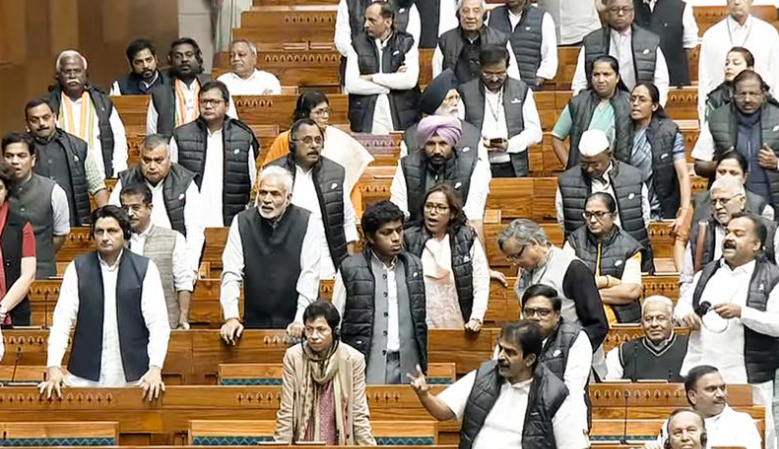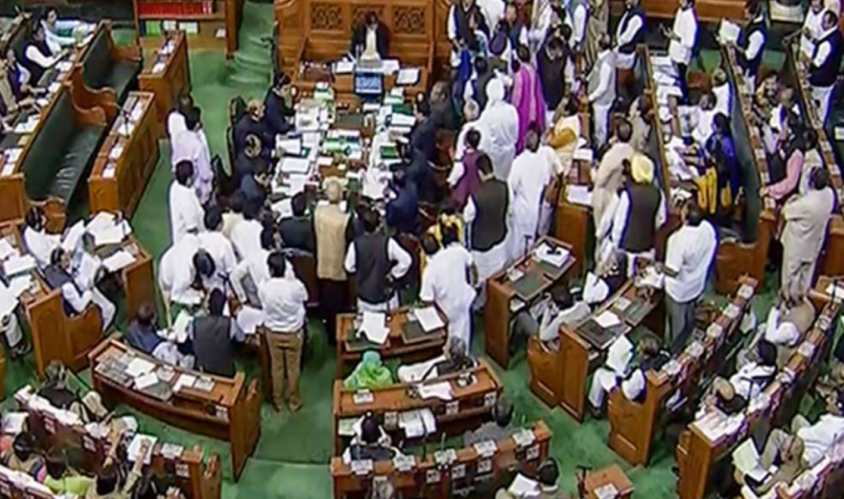Uproar in House Winter Session of Parliament witnessed a heated debate as opposition members raised strong objections to the government’s decision to introduce new Bills with Hindi and Sanskrit titles. Alleging an imposition of Hindi on non-Hindi-speaking states, opposition MPs accused the Centre of undermining the linguistic diversity of India. Meanwhile, the government defended the move, stating that it was a reflection of Indian culture and legacy.
The Debate Unfolds
On Wednesday, as the Winter Session convened, opposition members raised slogans and displayed placards in the Lok Sabha, accusing the government of trying to impose Hindi on the nation. The controversy erupted when a series of Bills with titles in Hindi and Sanskrit were tabled for discussion. The opposition alleged that this practice alienated non-Hindi-speaking states and created a barrier for understanding legislative content.
YSRCP MP S. Niranjan Reddy, one of the vocal critics of the move, pointed out that the Constitution does not support giving a Hindi title to a Bill whose content is primarily in English. He argued that such a practice runs contrary to the spirit of inclusivity enshrined in the Constitution.
Opposition’s Stand
Opposition parties, including the Congress, DMK, TMC, and others, accused the government of promoting linguistic hegemony. Their arguments were multifaceted:
- Exclusion of Non-Hindi-Speaking Population: MPs from Tamil Nadu, Kerala, West Bengal, and other non-Hindi-speaking regions emphasized that naming Bills in Hindi or Sanskrit would marginalize a significant portion of the population who are not fluent in these languages.
- Violation of Constitutional Principles: Article 343 of the Constitution recognizes Hindi and English as official languages of the Union. Opposition leaders contended that prioritizing Hindi over English in legislative nomenclature violated the principle of linguistic equality.
- Regional Sentiments: The opposition highlighted how language is deeply tied to regional identities. Tamil Nadu’s DMK MPs, in particular, voiced strong objections, Uproar in House stating that Tamil has an ancient literary tradition and deserves equal respect.
- Accessibility Issues: Critics argued that the use of Hindi or Sanskrit titles makes legislative processes less accessible to ordinary citizens who rely on English for clarity and understanding.
Government’s Defense
Union Ministers and ruling party MPs defended the decision, Uproar in House asserting that the use of Hindi and Sanskrit in the titles of Bills was a matter of national pride and a reflection of India’s cultural heritage.
- Promoting Indian Culture: The government argued that using Hindi and Sanskrit honors India’s linguistic legacy and promotes a sense of unity in diversity.
- Symbolic Representation: Union Minister for Parliamentary Affairs Pralhad Joshi stated that the titles serve as symbolic markers of India’s ancient and rich linguistic traditions, Uproar in House while the content remains accessible in English for clarity.
- No Compulsion: Defending the move, the government emphasized that there was no compulsion to use Hindi or Sanskrit exclusively, and translations in English would always accompany such Bills.
- Encouraging Linguistic Inclusivity: The government maintained that the use of Hindi and Sanskrit does not imply imposition but rather an effort to highlight the importance of India’s native languages in governance.
 For the more information click on this link
For the more information click on this link
Constitutional Provisions and Historical Context
The linguistic issue has been a recurring point of contention in Indian politics. The Constitution recognizes 22 scheduled languages, and while Hindi and English are the official languages of the Union, Uproar in House regional languages are also given significant importance.
Article 120: Language to Be Used in Parliament
According to Article 120, proceedings in Parliament may be conducted in Hindi or English. This ensures that both Hindi-speaking and non-Hindi-speaking members can participate without barriers.
Three-Language Formula
The three-language formula introduced in the 1960s aimed to promote linguistic harmony by encouraging the study of Hindi, English, and a regional language. However, it has often faced resistance, Uproar in House particularly from southern states.
Historical Resistance
The anti-Hindi agitations of Tamil Nadu in the 1960s are a stark reminder of the strong sentiments surrounding language in India. These protests were instrumental in shaping India’s language policies, Uproar in House ensuring that no single language dominates at the expense of others.
Experts Weigh In
Linguistic experts and constitutional scholars have weighed in on the issue, Uproar in House offering diverse perspectives:
- Dr. R. Subramanian, Linguist: “India’s linguistic diversity is its strength. While promoting Hindi and Sanskrit is commendable, Uproar in House it should not come at the cost of alienating non-Hindi speakers. Legislative processes must prioritize inclusivity.”
- Prof. Meera Sharma, Constitutional Expert: “The Constitution provides for linguistic freedom and equality. Naming Bills in Hindi or Sanskrit might appear symbolic, Uproar in House but it risks creating unnecessary friction in a multilingual country.”
- Dr. Amitabh Rao, Cultural Historian: “Sanskrit and Hindi are integral to India’s heritage. However, the government must strike a balance to ensure that such initiatives do not alienate certain regions.”
Public Reaction
The debate has spilled over into public discourse, with social media platforms buzzing with opinions. Hashtags like #HindiImposition and #LinguisticDiversity have trended, Uproar in House reflecting the polarized views on the matter.
Support for the Move
Proponents argue that promoting Hindi and Sanskrit is essential for preserving India’s cultural identity. They believe that embracing native languages in governance strengthens national unity.
Opposition and Criticism
Critics see the move as an attempt to centralize power and marginalize non-Hindi-speaking states. Many view it as a step back from India’s commitment to linguistic pluralism.  For the more information click on this link
For the more information click on this link
The Way Forward
The uproar in Parliament underscores the need for a balanced approach to language policy. While it is essential to honor India’s linguistic heritage, it is equally crucial to respect the diversity that defines the nation. Here are some potential steps to address the issue:
- Multilingual Titles: Introducing Bills with titles in multiple languages, including English and regional languages, can ensure inclusivity.
- Consultation with States: The Centre could engage in dialogue with state governments to address regional concerns and foster consensus.
- Awareness Campaigns: Educating the public about the significance of linguistic heritage while emphasizing inclusivity can help bridge the gap.
- Strengthening Translation Mechanisms: Ensuring accurate and timely translations of legislative content in multiple languages can enhance accessibility.
Conclusion
The controversy over Hindi and Sanskrit names for new Bills highlights the delicate balance India must maintain as a multilingual democracy. While the government’s intent to promote cultural heritage is commendable, it must be tempered with sensitivity toward regional identities and linguistic diversity. As Parliament continues its deliberations, Uproar in House the hope is for a resolution that upholds the spirit of inclusivity and unity that forms the cornerstone of India’s democracy. ALSO READ:- Pushpa 2 Release, Review Highlights: Allu Arjun’s Film Shatters Records, Expected to Gross Rs 250 Crores on Day 1 2024




